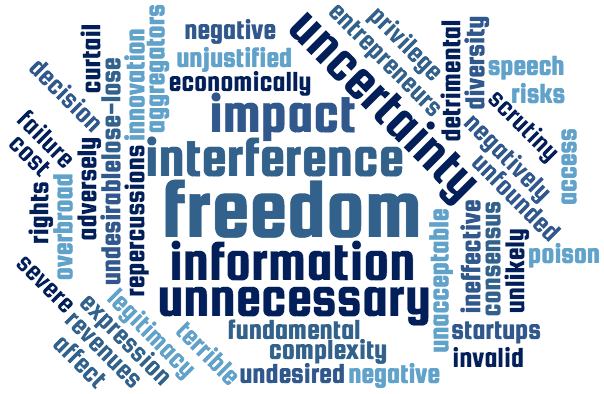The European Commission plans to expand copyright in the EU in ways that threaten core functions of the internet: Links and file uploads.
Independent academic experts have denounced these plans in untypically frank terms as “ill-conceived”, “undesirable”, “unlikely to achieve anything”, “an interference with freedom of speech”, “displaying an alarming disregard for fundamental rights” and bad for everyone from authors, small publishers and startups to the news industry as a whole. (See sources below.)
The European Parliament will soon make a decision on these plans. While some members clearly share the experts’ criticism, others aren’t just cheering on these plans but even, incredibly, seeking their expansion.
Experts on the reform:  |
Some MEPs on the reform:
https://www.youtube.com/watch?v=yx2b0ZXhJus |
1. Extra copyright for news sites
The EU Commission plan: Introduce a new extra copyright for publishers of news sites. Spreading or copying even the shortest snippet from an article would then require a license from the publisher. Sharing a link to an article on Facebook or Twitter would be affected, because the little preview that shows up – an image, the headline, an extract – would infringe against this new right.
Independent Experts:
“There is independent scientific consensus that [this] cannot be allowed to stand.” – Open Letter from European Research Centres
“Would be an interference with freedom of speech that deserves much stricter scrutiny” – Prof. Dr. Mireille van Eechoud, Institute for Information Law, University of Amsterdam
“Unnecessary, undesirable, would introduce an unacceptable level of uncertainty and be unlikely to achieve anything apart from adding to […] complexity and cost” – 37 UK professors and scholars of Intellectual Property, Information Law and Digital Economy
“will … negatively affect freedom of expression and information”, “will not in any way benefit the newspaper industry“, “will ultimately privilege […] providers such as Google”, “startups will be prevented from entering this emerging market” – European Copyright Society
“Serious, unjustified interferences with fundamental rights“, “economically unfounded”, “will not create additional revenues for press publishers”, “will not foster quality journalism“, “adversely affects authors“, “The decision between the two versions of failure (invalidity or ineffectiveness) will take years […] without furthering any of the aims” – Prof. Dr. Alexander Peukert, Goethe-Universität Frankfurt am Main
“Detrimental for authors’ interests”, “Overbroad“, “Negative impact on small publishers“, “Risks having undesired repercussions for the acceptability and legitimacy of the copyright system as a whole” – Centre for International Intellectual Property Studies, University of Strasbourg
Advocates and stakeholders:
“A terrible solution good for no one” (Communia), “Could have severe negative impacts on media diversity, innovation and access to information” (Open Rights Group), “would […] curtail academic freedom” (Research Libraries), “Poison to European entrepreneurs” (Startups), “would create a ‘lose-lose’ situation for press publishers, journalists, search engines, news aggregators and last but not least Internet users” (Austrian alliance)
Your representatives:
Group spokespeople (rapporteurs):

“Digitisation does make it easier for [publishers’] content to be taken, but it also facilitates access. That is why I have proposed a middle way: A legal presumption. It will provide publishers with an unquestionable place at the negotiating table and also an unquestionable legal standing in courts. Going further is in my opinion a step into the unknown.” –MEP Comodini, representing the Conservatives in the JURI Committee and also overall responsible

“There is no need to create more rights. There is no reason to complicate the situation that is already quite complex” –MEP Geringer de Oedenberg, representing the Social Democrats in the JURI Committee

“Good news”, “Press agencies should have neighboring rights extended to them”, “A press publication is not just a literary work, but could be photos, videos, any kind of new material – we need to recognize these works with these rights” –MEP Cavada, representing the Liberals

“Safeguarding the right to link to news is extremely important”, “[The proposal] should be deleted”, “We can discuss [Ms Comodinis compromise proposal], but I have concerns” –MEP Reda, representing the Greens/EFA
Individual MEPs:
“A very good proposal”, “We really need to think about the publishers’ contributions” –MEP Niebler, Conservative
“Press freedom is under threat”, “We need to have related rights for press workers” –MEP LeGrip, Conservative
“The Commission proposal was very good“, “Others are taking advantage of the legal weakness of publishers”, “The remuneration of the media is called into question”, “[Ms Comodini] […] lost sight of the objective.” –MEP Rozière, Social Democrat
* * *
 2. Censorship machines
2. Censorship machines
The EU Commission plan: Obligate internet platforms that host “a lot of” user-contributed content to scan each upload for potential copyright infringement. This would obviously apply to video and photo sharing services, but also to sites like Wikipedia, Github and many more. They would need to develop the technology necessary to detect certain content and surveil all their user uploads.
Independent ExpertS:
“There is independent scientific consensus that [this] cannot be allowed to stand.“– Open Letter from European Research Centres
“Ill-conceived, badly-worded and incompatible with established law” … “Betrays […] an alarming disregard for the law of fundamental rights.” – Dr. Christina Angelopoulos, Centre for Intellectual Property and Information Law, University of Cambridge
“May … be locking in YouTube’s dominance in the EU”, “entry to this market for newcomers may become all but impossible” – European Copyright Society
“The E-Commerce Directive prohibits Member States from requiring intermediaries to impose general monitoring duties. Yet, [the proposal] seems to introduce such a[n] obligation.” – European Parliament Research Service
“The final result of the reform may thus be further market concentration and less information diversity”, “It will be much more difficult to find investors for new start-up platforms” – Prof Dr Martin Senftleben, Professor of intellectual property, VU Amsterdam
Advocates:
“Neither balanced nor sensible”, “Full of ideas that will hurt users and the platforms on which they rely, in Europe and around the world”, “incompatible with European law and human rights“ (EFF), “Would greatly restrict the way Europeans create, share, and communicate online”, “violate fundamental rights of users”, “ill-targeted”, “a dangerous precedent” (Communia), “Privatised censorship and filtering of free speech” (EDRi), “very negative impacts on the internet”, “will almost certainly harm the development of a European digital industry” (Open Rights Group)
Your representatives:
Group spokespeople (rapporteurs):
“We need protection of copyright without changing the E-Commerce Directive or losing the exceptions and limitations for which we have fought greatly”, “I disagree that we should give a legal dress to blanket technical measures”, “We need certainty on who we are speaking of and which content we are adressing.”– MEP Comodini, representing the Conservatives in the JURI Committee and also overall responsible
“All those [platforms] who currently claim to just store content actually do more than that” – MEP Arimont, representing the Conservatives in the IMCO Committee
“Very good intentions”, “not a good proposal because it is very unclear and it will not be possible to implement in practice”, “I don’t think [this] need[s] to be included in this legislation” –MEP Geringer de Oedenberg, representing the Social Democrats in the JURI Committee
“Basic internet freedoms of users need to be respected when placing obligations on intermediaries”, “this house has consistently fought against mass surveillance” –MEP Stihler, representing the Social Democrats in the IMCO Committee
“Exactly the wrong way to try and legislate on the internet”, “risks harming internet freedom for consumers” –MEP Dalton, representing the Euro-sceptic Conservatives in the IMCO Committee
“Very important“, “There are filters in terms of sensitive content, fighting terrorism and racism and incitement to hatred – so why should it be so hard to extend filtering to copyrighted content? We have the mechanisms already“, “We need to clarify that platforms have an active role in communication to the public”, “More needs to be done” –MEP Cavada, representing the Liberals in the JURI Committee
“The discussion has seriously lacked evidence” “don’t believe in an approach where platforms are policing the content with automated systems” –MEP Kallas, representing the Liberals in the IMCO Committee
“Creates friction with existing EU law”, “breaks with [what] has been crucial to the success of the Internet economy”, “conflict with fundamental rights”, “should be deleted”, “[Ms Comodini’s] proposal still extends liability”, “still lists Content ID as an option for measures for platforms to take”, “I don’t think we should be encouraging such measures even as an option” –MEP Reda, representing the Greens
Individual MEPs:
“We have to preserve and strengthen [the plan]” –MEP LeGrip, Conservative
“We need to be much more critical of platforms”, “I don’t believe a distinction between active and passive platforms exists, I think everything is active“, “If you create an algorithm you are making a judgement about what it does”, “There really is no such thing as a free internet, because everyone involved in the internet, in putting items and works out in the public domain, has those responsibilities and has to be under the law” –MEP Honeyball, Social Democrat
“[On platforms] there is some editorial work, some platforms suppress certain works because they might be offensive”, “[The Commission proposal] goes in the right direction, I would like it to go further“ –MEP Rozière, Social Democrat
“The Commission has made a very reasonable proposal“, “[Ms Comodini’s proposal] would extremely weaken the original proposal, I prefer the Commission’s clear wording”, “We cannot let our European creative industries be sold out here” –MEP Niebler, Conservative
***
The Members of the European Parliament defending these plans may have nothing but good intentions, wanting to help out creators and/or companies in the creative economy. Therefore, they are receptive to arguments by the big publishing and music industry lobbies, who say that internet platforms – rich, power-abusing foreign entities – should be tapped for that purpose.
We all agree that internet platforms must be subject to democratic regulation. And in this rapidly changing media landscape, creators deserve some support. However, as the academic experts unanimously confirm: The problem, culprits and solutions are being misidentified here. The plans on the table are way more likely to backfire and cause massive damage to the internet than they are to fix any real problem or improve any artist’s life.
At this point, the outcome of this debate is up in the air. Can you help letting these politicians know that their support of these bad ideas is not just at odds with overwhelming expert opinion – but also with the will of their voters?
Pick your favorite quote from the experts above and make the MEPs representing you aware of it. Inform them about the expert assessment(s), inquire about their position and politely share your concerns:
- Use the SaveTheMeme tool to call your MEP for free – phone calls are most effective
- Use the SaveTheLink form to email the MEPs of your country – please customize the text
Sources of MEP quotes: Debates in JURI Committee in January and March 2017, in IMCO Comittee in March 2017
To the extent possible under law, the creator has waived all copyright and related or neighboring rights to this work.




I am an EU citizen. I’m among those who still support the EU, despite its own limitations and share of corruption. That’s because the EU actually respects people, understands modern society, and doesn’t just destroy people’s rights whenever they feel like it (unlike the UK and other troubled nations). If anything close to this insanity happens, it means the EU is no longer a free and progressive world, and it no longer serves the purpose I hoped it did… we might want to start considering the “each country goes back to being its own country” scenario. However I hope that this will not prove to be the case.
All member states can voice their concerns about the copyright reform in the Council. If you believe that your national government is better at internet regulation than politicians at the EU level, please make sure they are rejecting the reform there!
At least for most of the member states, I have my doubts whether that’s the case… besides the fact that it’d make very little sense for these tiny countries to all regulate the web differently.
As Julia recently put it: “The lack of progressive legislation in the EU is not an institutional failure, but a consequence of the conservative majority”